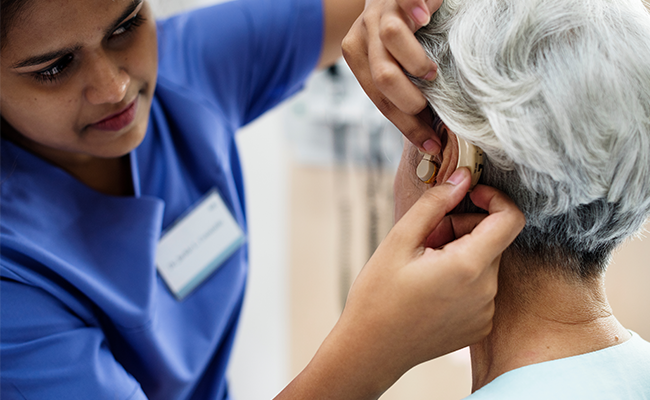 Improving quality of life for people living in residential aged care with dementia by increasing hearing and vision support is the focus of a $1.2 million University of Queensland-led study.
Improving quality of life for people living in residential aged care with dementia by increasing hearing and vision support is the focus of a $1.2 million University of Queensland-led study.
UQ researchers will work alongside clinicians, aged care staff and residents with dementia to co-develop solutions to improve hearing and vision care.
Professor Piers Dawes from UQ’s School of Health and Rehabilitation Sciences said up to 70 per cent of people living in aged care settings have dementia or cognitive impairment.
“Poor sensory function worsens quality of life and exacerbates the impact of dementia by making communication more difficult,” Professor Dawes said.
“It can also lead to reduced social engagement, increased dependency, disorientation and increased costs of care.
“Through this study we are aiming to develop effective and feasible solutions to ensure people living in aged care receive the help they need so they have the best quality of life.”
In general, over 90 per cent of people in residential aged care communities have hearing and or vision problems that are frequently undetected or under corrected.
Environmental factors such as poor lighting or noise can contribute to poor sensory functioning.
For residents living with dementia the impacts of poor sensory function are amplified.
Professor Dawes said in many cases aged care staff do not have training or confidence to support the hearing or vision needs or residents, and it can be difficult for people in these settings to access services.
“In this project we will work with aged care staff, clinicians, family, carers and residents to co-design a ‘sensory support intervention’,” Professor Dawes said.
“The intervention will train aged care staff to detect sensory problems and communicate better with aged care residents to ensure they have access to quality hearing and vision care.
“This includes access to hearing aids and glasses as well as improving the sensory environment by reducing lighting and noise.
“The intervention will then be rolled out in aged care settings and evaluated.”
UQ researchers will work with The University of New South Wales School of Optometry to conduct the study.
The project was awarded funding through the National Health and Medical Research Council Medical Research Future Fund.
Media: Professor Piers Dawes p.dawes@uq.edu.au; UQ Communications, Bridget Druery, b.druery@uq.edu.au, (+61) 435 221 246 @UQHealth.



